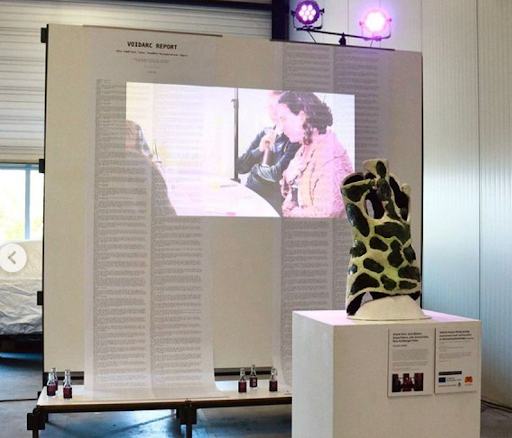During the recent Dutch Design Week, IANUS had the chance to collaborate in an expert exchange about trust in climate science. The starting point of the discussion was the interactive installation “iBreathe – why, when and who do we trust in relation to our future with climate change?”, created by students of Maastricht’s iArts students to explore themes of sustainability, air quality, and the human-environment relationship.
The event included a visit to the exhibit and a presentation by the iArts students involved in the project. Later, participants joined an in-depth discussion between experts, artists, and scholars on the installation’s themes. The aim of the exchange was to share reflections, insights, and viewpoints about social perceptions of climate science and sustainable innovations. The event was also a place to discuss the potential contribution of art and design to these issues.
The artists involved elaborated a metaphor to experience climate change from within and re-define trust. They tried to create an environment in which to host peaceful discussion through verbal and non-verbal communication. To answer this goal, the students of iArts imagined a fictional, futuristic reality in which the installation could take place. In this alternative future, the atmosphere is scarce in oxygen due to extreme pollution. As a result, a new technology called iBreathe was developed. iBreathe is essentially a special corset whose function is to check and control how much air each person consumes. When connected to other corsets in the vicinity, it is able to loosen or tighten according to the quality of the air, restricting oxygen intake when the resource is particularly scarce.
The artists imagined that the government of this speculative future would involve six participants for a ‘citizen council’ to talk about the corset and its implementation, allowing the spectators to explore the results of this council through the installation, encouragement questions of trust, technology, climate change, and power.

@iarts22 (https://www.instagram.com/p/DBgdL85tKVK/?img_index=1)
The installation wanted to provide participants with a chance to understand and experience knowledge through introspection, through an analysis of their inner world, avoiding the information overload caused by external sources. In doing so, the project recognized how science can often be used to serve additional purposes, becoming altered by the intervention of policies, businesses, and politicians and fostering distrust.
Climate change is arguably one of humanity’s greatest crises. In the vast ocean of data, reports, and voices surrounding the climate crisis, Trust in science can often get lost as we are deafened by the overwhelming amount of information that bombards us every day. Resorting to the metaphor of iBreathe and encouraging conversations around this possible future, the installation challenged participants and spectators to actually immerse themselves into a dystopia and experience the consequences of a climate crisis-struck world.
